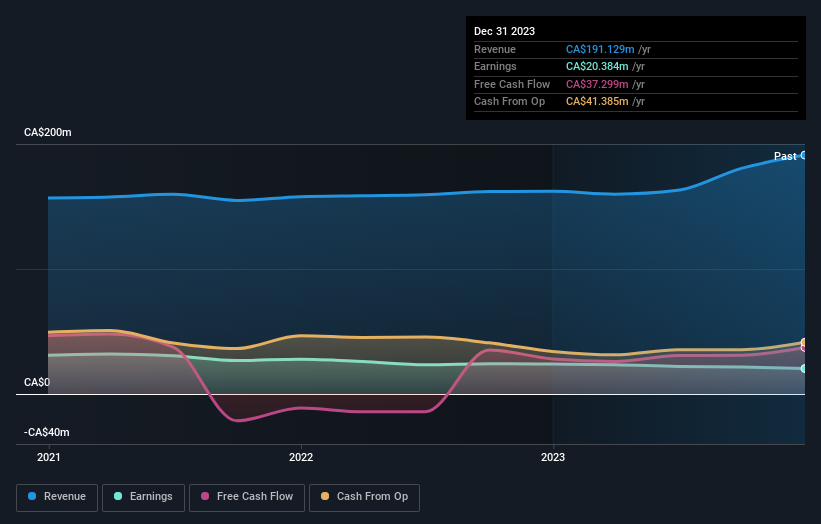Corby Spirit and Wine Limited (TSE:CSW.A) stock most popular amongst individual investors who own 47%, while public companies hold 44%
Key Insights
The considerable ownership by individual investors in Corby Spirit and Wine indicates that they collectively have a greater say in management and business strategy
The top 4 shareholders own 50% of the company
Past performance of a company along with ownership data serve to give a strong idea about prospects for a business
A look at the shareholders of Corby Spirit and Wine Limited (TSE:CSW.A) can tell us which group is most powerful. With 47% stake, individual investors possess the maximum shares in the company. In other words, the group stands to gain the most (or lose the most) from their investment into the company.
And public companies on the other hand have a 44% ownership in the company.
In the chart below, we zoom in on the different ownership groups of Corby Spirit and Wine.
See our latest analysis for Corby Spirit and Wine
What Does The Institutional Ownership Tell Us About Corby Spirit and Wine?
Institutional investors commonly compare their own returns to the returns of a commonly followed index. So they generally do consider buying larger companies that are included in the relevant benchmark index.
Corby Spirit and Wine already has institutions on the share registry. Indeed, they own a respectable stake in the company. This can indicate that the company has a certain degree of credibility in the investment community. However, it is best to be wary of relying on the supposed validation that comes with institutional investors. They too, get it wrong sometimes. When multiple institutions own a stock, there's always a risk that they are in a 'crowded trade'. When such a trade goes wrong, multiple parties may compete to sell stock fast. This risk is higher in a company without a history of growth. You can see Corby Spirit and Wine's historic earnings and revenue below, but keep in mind there's always more to the story.
We note that hedge funds don't have a meaningful investment in Corby Spirit and Wine. Pernod Ricard SA is currently the largest shareholder, with 44% of shares outstanding. CI Global Asset Management is the second largest shareholder owning 3.2% of common stock, and Brandes Investment Partners, LP holds about 2.1% of the company stock.
Our research also brought to light the fact that roughly 50% of the company is controlled by the top 4 shareholders suggesting that these owners wield significant influence on the business.
While studying institutional ownership for a company can add value to your research, it is also a good practice to research analyst recommendations to get a deeper understand of a stock's expected performance. Our information suggests that there isn't any analyst coverage of the stock, so it is probably little known.
Insider Ownership Of Corby Spirit and Wine
The definition of company insiders can be subjective and does vary between jurisdictions. Our data reflects individual insiders, capturing board members at the very least. Management ultimately answers to the board. However, it is not uncommon for managers to be executive board members, especially if they are a founder or the CEO.
Most consider insider ownership a positive because it can indicate the board is well aligned with other shareholders. However, on some occasions too much power is concentrated within this group.
Our information suggests that Corby Spirit and Wine Limited insiders own under 1% of the company. It appears that the board holds about CA$1.5m worth of stock. This compares to a market capitalization of CA$375m. We generally like to see a board more invested. However it might be worth checking if those insiders have been buying.
General Public Ownership
With a 47% ownership, the general public, mostly comprising of individual investors, have some degree of sway over Corby Spirit and Wine. This size of ownership, while considerable, may not be enough to change company policy if the decision is not in sync with other large shareholders.
Public Company Ownership
It appears to us that public companies own 44% of Corby Spirit and Wine. It's hard to say for sure but this suggests they have entwined business interests. This might be a strategic stake, so it's worth watching this space for changes in ownership.
Next Steps:
I find it very interesting to look at who exactly owns a company. But to truly gain insight, we need to consider other information, too. Case in point: We've spotted 3 warning signs for Corby Spirit and Wine you should be aware of, and 1 of them doesn't sit too well with us.
If you would prefer check out another company -- one with potentially superior financials -- then do not miss this free list of interesting companies, backed by strong financial data.
NB: Figures in this article are calculated using data from the last twelve months, which refer to the 12-month period ending on the last date of the month the financial statement is dated. This may not be consistent with full year annual report figures.
Have feedback on this article? Concerned about the content? Get in touch with us directly. Alternatively, email editorial-team (at) simplywallst.com.
This article by Simply Wall St is general in nature. We provide commentary based on historical data and analyst forecasts only using an unbiased methodology and our articles are not intended to be financial advice. It does not constitute a recommendation to buy or sell any stock, and does not take account of your objectives, or your financial situation. We aim to bring you long-term focused analysis driven by fundamental data. Note that our analysis may not factor in the latest price-sensitive company announcements or qualitative material. Simply Wall St has no position in any stocks mentioned.

 Yahoo Finance
Yahoo Finance 

